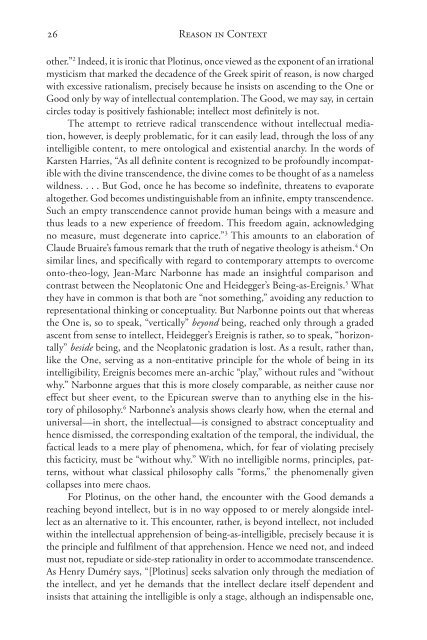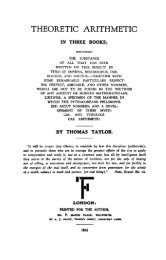Perl - The Good of the Intellect.pdf - Platonic Philosophy
Perl - The Good of the Intellect.pdf - Platonic Philosophy
Perl - The Good of the Intellect.pdf - Platonic Philosophy
You also want an ePaper? Increase the reach of your titles
YUMPU automatically turns print PDFs into web optimized ePapers that Google loves.
26<br />
Reason in Context<br />
o<strong>the</strong>r.” 2 Indeed, it is ironic that Plotinus, once viewed as <strong>the</strong> exponent <strong>of</strong> an irrational<br />
mysticism that marked <strong>the</strong> decadence <strong>of</strong> <strong>the</strong> Greek spirit <strong>of</strong> reason, is now charged<br />
with excessive rationalism, precisely because he insists on ascending to <strong>the</strong> One or<br />
<strong>Good</strong> only by way <strong>of</strong> intellectual contemplation. <strong>The</strong> <strong>Good</strong>, we may say, in certain<br />
circles today is positively fashionable; intellect most definitely is not.<br />
<strong>The</strong> attempt to retrieve radical transcendence without intellectual mediation,<br />
however, is deeply problematic, for it can easily lead, through <strong>the</strong> loss <strong>of</strong> any<br />
intelligible content, to mere ontological and existential anarchy. In <strong>the</strong> words <strong>of</strong><br />
Karsten Harries, “As all definite content is recognized to be pr<strong>of</strong>oundly incompatible<br />
with <strong>the</strong> divine transcendence, <strong>the</strong> divine comes to be thought <strong>of</strong> as a nameless<br />
wildness. . . . But God, once he has become so indefinite, threatens to evaporate<br />
altoge<strong>the</strong>r. God becomes undistinguishable from an infinite, empty transcendence.<br />
Such an empty transcendence cannot provide human beings with a measure and<br />
thus leads to a new experience <strong>of</strong> freedom. This freedom again, acknowledging<br />
no measure, must degenerate into caprice.” 3 This amounts to an elaboration <strong>of</strong><br />
Claude Bruaire’s famous remark that <strong>the</strong> truth <strong>of</strong> negative <strong>the</strong>ology is a<strong>the</strong>ism. 4 On<br />
similar lines, and specifically with regard to contemporary attempts to overcome<br />
onto-<strong>the</strong>o-logy, Jean-Marc Narbonne has made an insightful comparison and<br />
contrast between <strong>the</strong> Neoplatonic One and Heidegger’s Being-as-Ereignis. 5 What<br />
<strong>the</strong>y have in common is that both are “not something,” avoiding any reduction to<br />
representational thinking or conceptuality. But Narbonne points out that whereas<br />
<strong>the</strong> One is, so to speak, “vertically” beyond being, reached only through a graded<br />
ascent from sense to intellect, Heidegger’s Ereignis is ra<strong>the</strong>r, so to speak, “horizontally”<br />
beside being, and <strong>the</strong> Neoplatonic gradation is lost. As a result, ra<strong>the</strong>r than,<br />
like <strong>the</strong> One, serving as a non-entitative principle for <strong>the</strong> whole <strong>of</strong> being in its<br />
intelligibility, Ereignis becomes mere an-archic “play,” without rules and “without<br />
why.” Narbonne argues that this is more closely comparable, as nei<strong>the</strong>r cause nor<br />
effect but sheer event, to <strong>the</strong> Epicurean swerve than to anything else in <strong>the</strong> history<br />
<strong>of</strong> philosophy. 6 Narbonne’s analysis shows clearly how, when <strong>the</strong> eternal and<br />
universal—in short, <strong>the</strong> intellectual—is consigned to abstract conceptuality and<br />
hence dismissed, <strong>the</strong> corresponding exaltation <strong>of</strong> <strong>the</strong> temporal, <strong>the</strong> individual, <strong>the</strong><br />
factical leads to a mere play <strong>of</strong> phenomena, which, for fear <strong>of</strong> violating precisely<br />
this facticity, must be “without why.” With no intelligible norms, principles, patterns,<br />
without what classical philosophy calls “forms,” <strong>the</strong> phenomenally given<br />
collapses into mere chaos.<br />
For Plotinus, on <strong>the</strong> o<strong>the</strong>r hand, <strong>the</strong> encounter with <strong>the</strong> <strong>Good</strong> demands a<br />
reaching beyond intellect, but is in no way opposed to or merely alongside intellect<br />
as an alternative to it. This encounter, ra<strong>the</strong>r, is beyond intellect, not included<br />
within <strong>the</strong> intellectual apprehension <strong>of</strong> being-as-intelligible, precisely because it is<br />
<strong>the</strong> principle and fulfilment <strong>of</strong> that apprehension. Hence we need not, and indeed<br />
must not, repudiate or side-step rationality in order to accommodate transcendence.<br />
As Henry Duméry says, “[Plotinus] seeks salvation only through <strong>the</strong> mediation <strong>of</strong><br />
<strong>the</strong> intellect, and yet he demands that <strong>the</strong> intellect declare itself dependent and<br />
insists that attaining <strong>the</strong> intelligible is only a stage, although an indispensable one,
















